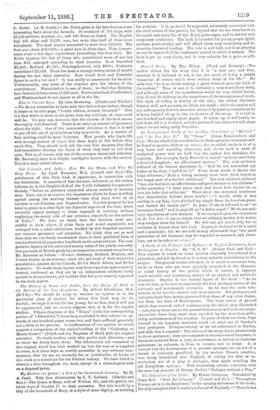This volume is based on some articles originally contributed to
a periodical, and will be found to be a very valuable contribution to the subject. The general reader will meet in it much to entertain him, while to those who are more specially interested in the dramatic or social history of the period which it covers, it supplies much valuable and interesting matter of an original and authentic character. Dryden is the central figure of the book :—" As ho was the last, so he was incomparably the best prologue-writer of the sixteenth and seventeenth centuries. As he was the most volu- minous, so ho was the neatest and most precise. His prologues and epilogues have been better preserved than those of any other drama- tist from the time of Shakespeare. The large extent of ground
which they covered, and of contemporary life which they illustrated —valuable as these are to the general historian as well as to the stage- chronicler—have been more than eqsalled by the matchless pellu- cidity and terseness of his couplets. In point of clear-cut form, Pope himself in his happiest moments could mot rival one of Dryden's best prologues. Prologne.writing as an art culminated in Dryden, and with him it expired." The critics of the stage figure prominently in these prologues ; they are compared to thieves turned hangmeo, to butchers excluded from a jury, to scriveners, to wolves, to bankrupt gamesters, to vultures, to fleas, to locusts, and to whips. It is noticed how the development of a genuine prologue into an act of a drama is curiously paralleled by the modern French practice, now being introduced into England, of calling the first or in- troductory act of a play a prologue, thus again recalling the old Euripidean wpAoyos. This interesting volume concludes with the amusing account of George Peele's "Prologue without a Play."


































 Previous page
Previous page